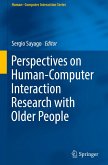This is the first extensive compilation documenting contemporary third wave HCI, covering key methodological developments at the leading edge of human-computer interactions. Now in its second decade as a major current of HCI research, the third wave integrates insights from the humanities and social sciences to emphasize human dimensions beyond workplace efficiency or cognitive capacities. Where the earliest HCI work has been strongly based on the concept of human-machine coupling, which expanded to workplace collaboration as computers came into mainstream professional use, today HCI can connect to almost any human experience because there are new applications for every aspect of daily life.
Volume 2 - Methodologies covers methodological approaches grounded in autoethnography, empathy-based design, crowdsourcing, psychometrics, user engagement, speculative design, somatics, embodied cognition, peripheral practices and transdisciplinarity.
Volume 2 - Methodologies covers methodological approaches grounded in autoethnography, empathy-based design, crowdsourcing, psychometrics, user engagement, speculative design, somatics, embodied cognition, peripheral practices and transdisciplinarity.








